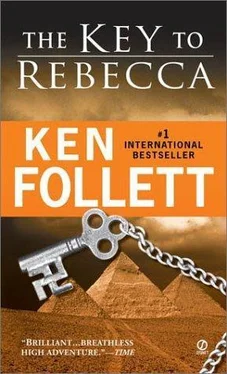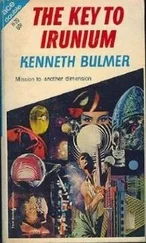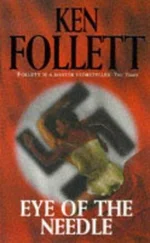Ken Follett - The Key to Rebecca
Здесь есть возможность читать онлайн «Ken Follett - The Key to Rebecca» весь текст электронной книги совершенно бесплатно (целиком полную версию без сокращений). В некоторых случаях можно слушать аудио, скачать через торрент в формате fb2 и присутствует краткое содержание. Жанр: Шпионский детектив, на английском языке. Описание произведения, (предисловие) а так же отзывы посетителей доступны на портале библиотеки ЛибКат.
- Название:The Key to Rebecca
- Автор:
- Жанр:
- Год:неизвестен
- ISBN:нет данных
- Рейтинг книги:4 / 5. Голосов: 1
-
Избранное:Добавить в избранное
- Отзывы:
-
Ваша оценка:
- 80
- 1
- 2
- 3
- 4
- 5
The Key to Rebecca: краткое содержание, описание и аннотация
Предлагаем к чтению аннотацию, описание, краткое содержание или предисловие (зависит от того, что написал сам автор книги «The Key to Rebecca»). Если вы не нашли необходимую информацию о книге — напишите в комментариях, мы постараемся отыскать её.
The Key to Rebecca — читать онлайн бесплатно полную книгу (весь текст) целиком
Ниже представлен текст книги, разбитый по страницам. Система сохранения места последней прочитанной страницы, позволяет с удобством читать онлайн бесплатно книгу «The Key to Rebecca», без необходимости каждый раз заново искать на чём Вы остановились. Поставьте закладку, и сможете в любой момент перейти на страницу, на которой закончили чтение.
Интервал:
Закладка:
Ken Follett
The Key to Rebecca
TO ROBIN McGIBBON
“Our spy in Cairo is the greatest hero of them all. ”
—Erwin Rommel, September 1942
(Quoted by Anthony Cave Brown in Bodyguard of Lies)
PART ONE
TOBRUK
1
THE LAST CAMEL COLLAPSED AT NOON.
It was the five-year-old white bull he had bought in Gialo, the youngest and strongest of the three beasts, and the least ill-tempered: he liked the animal as much as a man could like a camel, which is to say that he hated it only a little.
They climbed the leeward side of a small hill, man and camel planting big clumsy feet in the inconstant sand, and at the top they stopped. They looked ahead, seeing nothing but another hillock to climb, and after that a thousand more, and it was as if the camel despaired at the thought. Its forelegs folded, then its rear went down, and it couched on top of the hill like a monument, staring across the empty desert with the indifference of the dying.
The man hauled on its nose rope. Its head came forward and its neck stretched out, but it would not get up. The man went behind and kicked its hindquarters as hard as he could, three or four times. Finally he took out a razor-sharp curved Bedouin knife with a narrow point and stabbed the camel’s rump. Blood flowed from the wound but the camel did not even look around.
The man understood what was happening. The very tissues of the animal’s body, starved of nourishment, had simply stopped working, like a machine that has run out of fuel. He had seen camels collapse like this on the outskirts of an oasis, surrounded by life-giving foliage which they ignored, lacking the energy to eat.
There were two more tricks he might have tried. One was to pour water into its nostrils until it began to drown; the other to light a fire under its hindquarters. He could not spare the water for one nor the firewood for the other, and besides neither method had a great chance of success.
It was time to stop, anyway. The sun was high and fierce. The long Saharan summer was beginning, and the midday temperature would reach 110 degrees in the shade.
Without unloading the camel, the man opened one of his bags and took out his tent. He looked around again, automatically: there was no shade or shelter in sight—one place was as bad as another. He pitched his tent beside the dying camel, there on top of the hillock.
He sat cross-legged in the open end of the tent to make his tea. He scraped level a small square of sand, arranged a few precious dry twigs in a pyramid and lit the fire. When the kettle boiled he made tea in the nomad fashion, pouring it from the pot into the cup, adding sugar, then returning it to the pot to infuse again, several times over. The resulting brew, very strong and rather treacly, was the most revivifying drink in the world.
He gnawed at some dates and watched the camel die while he waited for the sun to pass overhead. His tranquillity was practiced. He had come a long way in this desert, more than a thousand miles. Two months earlier he had left El Agela, on the Mediterranean coast of Libya, and traveled due south for five hundred miles, via Gialo and Kufra, into the empty heart of the Sahara. There he had turned east and crossed the border into Egypt unobserved by man or beast. He had traversed the rocky wasteland of the Western Desert and turned north near Kharga: and now he was not far from his destination. He knew the desert, but he was afraid of it—all intelligent men were, even the nomads who lived all their lives here. But he never allowed that fear to take hold of him, to panic him, to use up his nervous energy. There were always catastrophes: mistakes in navigation that made you miss a well by a couple of miles; water bottles that leaked or burst; apparently healthy camels that got sick a couple of days out. The only response was to say Inshallah: It is the will of God.
Eventually the sun began to dip toward the west. He looked at the camel’s load, wondering how much of it he could carry. There were three small European suitcases, two heavy and one light, all important. There was a little bag of clothes, a sextant, the maps, the food and the water bottle. It was already too much: he would have to abandon the tent, the tea set, the cooking pot, the almanac and the saddle.
He made the three cases into a bundle and tied the clothes, the food and the sextant on top, strapping the lot together with a length of cloth. He could put his arms through the cloth straps and carry the load like a rucksack on his back. He slung the goatskin water bag around his neck and let it dangle in front.
It was a heavy load.
Three months earlier he would have been able to carry it all day then play tennis in the evening, for he was a strong man; but the desert had weakened him. His bowels were water, his skin was a mass of sores, and he had lost twenty or thirty pounds. Without the camel he could not go far.
Holding his compass in his hand, he started walking.
He followed the compass wherever it led, resisting the temptation to divert around the hills, for he was navigating by dead reckoning over the final miles, and a fractional error could take him a fatal few hundred yards astray. He settled into a slow, long-strided walk. His mind emptied of hopes and fears and he concentrated on the compass and the sand. He managed to forget the pain of his ravaged body and put one foot in front of the other automatically, without thought and therefore without effort.
The day cooled into evening. The water bottle became lighter around his neck as he consumed its contents. He refused to think about how much water was left: he was drinking six pints a day, he had calculated, and he knew there was not enough for another day. A flock of birds flew over his head, whistling noisily. He looked up, shading his eyes with his hand, and recognized them as Lichtenstein’s sandgrouse, desert birds like brown pigeons that flocked to water every morning and evening. They were heading the same way as he was, which meant he was on the right track, but he knew they could fly fifty miles to water, so he could take little encouragement from them.
Clouds gathered on the horizon as the desert cooled. Behind him, the sun sank lower and turned into a big yellow balloon. A little later a white moon appeared in a purple sky.
He thought about stopping. Nobody could walk all night. But he had no tent, no blanket, no rice and no tea. And he was sure he was close to the well: by his reckoning he should have been there.
He walked on. His calm was deserting him now. He had set his strength and his expertise against the ruthless desert, and it began to look as if the desert would win. He thought again of the camel he had left behind, and how it had sat on the hillock, with the tranquillity of exhaustion, waiting for death. He would not wait for death, he thought: when it became inevitable he would rush to meet it. Not for him the hours of agony and encroaching madness—that would be undignified. He had his knife.
The thought made him feel desperate, and now he could no longer repress the fear. The moon went down, but the landscape was bright with starlight. He saw his mother in the distance, and she said: “Don’t say I never warned you!” He heard a railway train that chugged along with his heartbeat, slowly. Small rocks moved in his path like scampering rats. He smelled roast lamb. He breasted a rise and saw, close by, a red glow of the fire over which the meat had been roasted, and a small boy beside it gnawing the bones. There were the tents around the fire, the hobbled camels grazing the scattered thorns, and the wellhead beyond. He walked into the hallucination. The people in the dream looked up at him, startled. A tall man stood up and spoke. The traveler pulled at his howli, partially unwinding the cloth to reveal his face.
Читать дальшеИнтервал:
Закладка:
Похожие книги на «The Key to Rebecca»
Представляем Вашему вниманию похожие книги на «The Key to Rebecca» списком для выбора. Мы отобрали схожую по названию и смыслу литературу в надежде предоставить читателям больше вариантов отыскать новые, интересные, ещё непрочитанные произведения.
Обсуждение, отзывы о книге «The Key to Rebecca» и просто собственные мнения читателей. Оставьте ваши комментарии, напишите, что Вы думаете о произведении, его смысле или главных героях. Укажите что конкретно понравилось, а что нет, и почему Вы так считаете.












